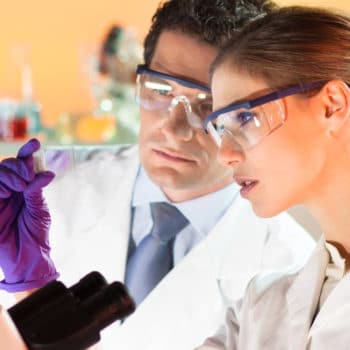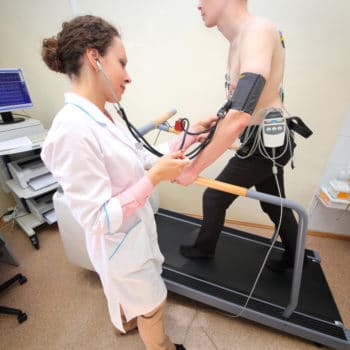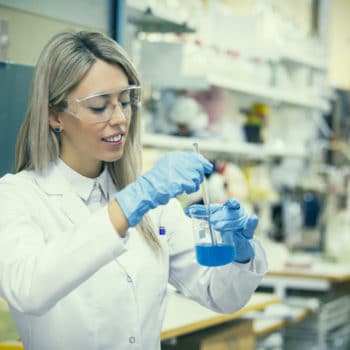Why We Love It
-
$31,680Potential Avg. Salary
-
9.3%Job Growth Rate
-
Growing DemandJob Outlook
-
Dependable Daily WorkloadCareer Attribute
Pharmacy technicians assist pharmacists with day-to-day tasks related to managing a pharmacy. They may help fill prescriptions, answer patient questions, and ensure prescription don’t conflict with other medications. They also assist with billing and insurance tasks, and handle cash registers for transactions.
Recommended Schools
What is a Pharmacy Technician?
The following job responsibilities are common for individuals in pharmacy technician roles:
- Receive and validate patient prescriptions
- Assist the pharmacist with filling prescriptions by collections medications, labeling prescription bottles, and printing prescription documentation
- Assist patients with filing insurance claims and billing questions, and collect monies owed for prescriptions
A Day in the Life
The role of a pharmacist is one of critical importance because mistakes with prescriptions can be life-threatening for patients. However, the work that must be conducted in a pharmacy is much more than just filling prescriptions. To allow the pharmacist to focus on the most critical tasks of his/her role, most pharmacies also employ pharmacy technicians. Pharmacy technicians act as assistants to pharmacists and help with all of the day-to-day responsibilities of filling prescriptions and billing customers.
Pharmacy technicians may be allowed to fill prescriptions—mix compounds or collect medications from stock—but the final prescription must be reviewed by the pharmacist before it is delivered to the customer. Beyond filling prescriptions, pharmacy technicians also perform most of the work of interacting with pharmacy customers. They perform prescription intakes and review patient health insurance to determine the final billing amount for the prescription. They also answer patient questions.
After a prescription is received, the pharmacy technician prepares all of the necessary containers and paperwork for the patient. He/she may affix labels to the prescription bottles, print medication information and instruction documents, and file prescriptions for easy discovery upon pickup. The pharmacy technician also collects any required documentation from the patient—identification and signatures for controlled substances—and alerts the pharmacist when patients have questions.
Typical Work Schedule
Most pharmacy technician roles are full-time positions, though the hours worked may be irregular. Some pharmacies are open on evenings and weekends, and some are even open 24 hours a day. This means that pharmacy technicians may be required to work first, second, and third shifts, and may also need to work weekends or holidays.
Projected Job Growth
Demand for pharmacy technicians is expected to increase in the coming decade as a result of the aging Baby Boomer generation. As this large generation continues to age, more prescriptions will need to be filled to manage health concerns, increasing the need for qualified pharmacy technicians.
Typical Employers
The majority of pharmacy technicians work for major drug stores like CVS, Walgreens, and Rite-Aid. Some also work for grocery and department stores with on-site pharmacies, and some pharmacy technicians work in hospitals where they assist pharmacists with preparing and delivering medications to hospitalized patients.
Recommended Schools
How To Become a Pharmacy Technician
It’s possible to become a pharmacy technician with only a high school diploma. Some employers are willing to train aspiring pharmacy techs on the job, but most tend to hire from an existing pool of drug store employees. For this reason, the easiest way to break into the field with only a high school diploma is to find a job working as a cashier or stocker at a major pharmacy chain, and network with the staff pharmacists. If your work ethic is impressive, the pharmacist may be willing to hire and train you when new positions for pharmacy technicians open.
Conversely, aspiring pharmacy techs may be able to expedite their entrance into the career by earning a certificate in pharmacy technology. These certificate programs are offered by community, trade, and vocational colleges and typically require a year or less of classroom instruction. In these programs, students learn the basics of medication compounding and ethics, which reduces the amount of on the job training they’ll need. For this reason, certified pharmacy techs tend to find work in the field more easily and quickly.
Some states require that pharmacy technicians become certified before they’re able to work in the field. Certification may require formal education (in the form of a pharmacy technology certificate), passing a written exam, and engaging in continuing education over the course of your career. Licensing opportunities are offered by either the Pharmacy Technician Certification Board (PTCB) or the National Healthcareer Association (NHA).
Pharmacy Technician Salary Data
We’ve provided you the following to learn more about this career. The salary and growth data on this page comes from recently published Bureau of Labor Statistics data while the recommendations and editorial content are based on our research.
National Anual Salary
Low Range
$24,760Average
$31,680High Range
$45,030National Hourly Wage
Low Range
$12/hrAverage
$15/hrHigh Range
$22/hrHow do Pharmacy Technician salaries stack up to other jobs across the country? Based on the latest jobs data nationwide, Pharmacy Technician's can make an average annual salary of $31,680, or $15 per hour. This makes it an Above Average Salary. On the lower end, they can make $24,760 or $12 per hour, perhaps when just starting out or based on the state you live in.
Salary Rankings And Facts
#675 Nationally for All Careers
Programs and Degrees
Here are the most common degrees for becoming a Pharmacy Technician. a is usually recommended and specifically a degree or coursework that prepares you for the particular field, see below.
Highest Education Among Pharmacy Technicians
- 1% Doctorate
- 1.7% Masters
- 16.1% Bachelors
- 21.4% Associates
- 35% College
- 22.9% High School
- 1.8% Less than High School
Job Growth Projections and Forecast
2014 Total Jobs
372,5002024 Est. Jobs
407,200Job Growth Rate
9.3%Est. New Jobs
34,700How does Pharmacy Technician job growth stack up to other jobs across the country? By 2024, there will be a change of 34,700 jobs for a total of 407,200 people employed in the career nationwide. This is a 9.3% change in growth over the next ten years, giving the career a growth rate nationwide of Below Average.
Growth Rankings And Facts
#226 Nationally for All Careers
What Companies Employ The Most Pharmacy Technicians
| Industry | Current Jobs | New Jobs Needed | % Increase |
|---|---|---|---|
| Pharmacies and drug stores | 192,100 | 7,700 | 8% |
| General medical and surgical hospitals; private | 49,000 | 3,500 | 4% |
| Other general merchandise stores | 27,600 | 12,100 | 12% |















